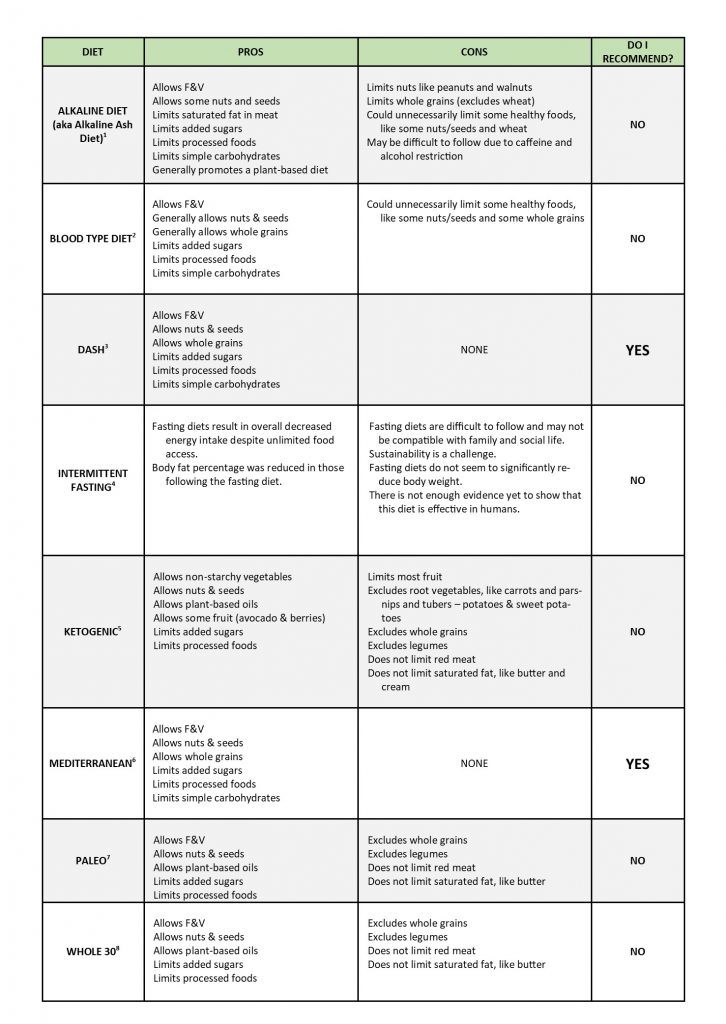
Paleo? Keto? Blood type diet? It seems like every week, a different popular diet trend emerges. As a dietitian, I receive many questions from program participants, family, and friends about how I feel about the newest diet fad. Luckily, there are two questions that many dietitians and I ask to determine if a diet is based in science and therefore recommended.
- Where does the diet stand on allowing or limiting these super foods?
- Fruits and vegetables
- Nuts and seeds
- Whole grains
- Plant-based oils, primary olive oil
- Legumes, including beans, peas, lentils, and split peas
- Where does the diet stand on allowing or limiting these unhealthy food items?
- Sugar
- Red meat
- Saturated fat
- Highly processed foods
I have analyzed eight popular diets through the lens of these two questions and listed the PROS, CONS, and whether I would RECOMMEND this diet in the table below. In November 2021, I have reviewed my 2018 analysis and updated my recommendations to reflect the recent research. *The only recommendation that has changed is for Intermittent Fasting, which I am changing from “No” to “May be beneficial for some to reduce nighttime snacking.”

Sources:
1Alkaline Diet: https://www.webmd.com/diet/a-z/alkaline-diets and https://www.eatrightpro.org/news-center/nutrition-trends/foods-and-supplements/what-impact-does-ph-have-on-food-and-nutrition
2Blood Type Diet: https://www.webmd.com/diet/a-z/blood-type-diet
2Dash: https://www.nhlbi.nih.gov/health-topics/dash-eating-plan
4Intermittent Fasting: Journal of Nutritional Science, 7, E22. doi:10.1017/jns.2018.13
5Ketogenic: https://ketodash.com/keto-diet and https://www.healthline.com/nutrition/ketogenic-diet-101#foods-to-avoid
6Mediterranean: https://www.mayoclinic.org/healthy-lifestyle/nutrition-and-healthy-eating/in-depth/mediterranean-diet/art-20047801 and https://medinsteadofmeds.com/
7Paleo: http://thepaleodiet.com/
8Whole 30: https://greatist.com/eat/whole30-beginners-guide
Don’t miss another great blog: Subscribe Now

I’m curious if you have researched Bright Line Eating? What are your thoughts if you have?
Thank you for reading our blog and asking about Bright Line Eating. I had not heard of this before, so thank you for bringing this to our attention. I was able to gather a little bit of information about this eating plan on their website here: https://brightlineeating.com/membership/. I did also find one published article here (https://academic.oup.com/cdn/article/5/Supplement_2/410/6293618?login=true) which reported positive results after the 8-week program. It does not look like follow-up analysis was completed. From what I have read, what I like about this eating pattern is the mindfulness component, the daily support, and the fact that it is a lifestyle change approach.
I have been using the Med diet for a little while now. The problem I have is, I don’t care for fish. What do you recommend to replace?
If you do not care for fish, it is important to replace with other lean protein sources, such as chicken, legumes, beans, nuts and seeds. Be sure to check out the medinsteadofmeds.com website for lots of Mediterranean vegetarian recipes that are great non-fish options.
I would also like to add that some of the diets you do not recommend are necessary for people with certain allergies and intolerances. Some people cannot eat whole grains, nuts, or many fruits, and while those foods are necessary for the majority of the population, your summary is not at all inclusive of those with non-standard dietary needs.
Thank you for your feedback and for reading our blogs. Yes, this is true that with all healthy diets, there will be individual differences for those with allergies and intolerances. My recommendations for the purposes of this blog are based on current evidence for the general population. On an individual level, please seek guidance from a Registered Dietitian Nutritionist (RDN) on your personal dietary needs.
Awesome post! I definitely learned a lot from this article. Thanks a lot for sharing!
Thank you Vic! We are glad you like it, please feel free to check back on our blog page for similar blogs in the future! 🙂
wondering if you recommend a diet in particular for Type 2 Diabetics? I see a lot of the diets with fruit but I am very limited by the amount of fruit I can take.
Thank you for reading our blog and for your question! Please consult your Registered Dietitian Nutritionist (RDN) for recommendations related to specific conditions.
Interesting Article but you left off the Whole-Food Plant Based Diet. It is a well documented diet that works well.
Thank you for reading our blogs and for your comment! The Whole-Food Plant Based Diet includes many of the same components as the Mediterranean Eating Pattern, of course without the animal protein. Thank you for bringing this diet to the conversation.
Wow. So incredibly biased. The diets you do recommend have 0 cons? They are absolutely perfect? The Standard American Diet (SAD) which recommends 8-11 servings of whole grains has lead 1/3 of Americans to preventable diabetes, yet you support diets that have unlimited whole grains? Where is the science here? Please cite sources that support limiting red meat and fat, if based on 90’s research that has since been proven outdated, please update your education. the National Center for Biotechnology Information conducted a 2010 analysis of 21 studies on saturated fat. During 5-23 years of follow-up of 347,747 subjects, 11,006 developed CHD or stroke. *Intake of saturated fat was not associated with an increased risk of CHD, stroke, or CVD.* (link below, because I can’t include it in here or the system thinks it’s spam).
Thank you very much for sharing your thoughtful feedback and for allowing me the opportunity to clarify. You are absolutely correct that consuming too many refined grains has led to preventable illness. When we removed fat from the diet in the fat-free craze, we replaced it too often with highly refined grain and/or sugar. This had a negative impact on chronic illness. Neither the DASH nor the Mediterranean diets recommends consumption of refined grains, nor do they recommend an unlimited amount of whole grains. They also both recommend very limited amounts of added sugar. The predominance of the literature indicates that intake of saturated fatty acids leads to an increase in CVD or at best is neutral. The study you indicate concludes that saturated fat alone does not increase risk, but that replacing saturated fat with poly and monounsaturated fats decreases risk significantly; this is what is recommended in the Mediterranean Diet and DASH Diet. Our chart that discusses the protein continuum does not eliminate red meat. We suggest consuming less, especially high fat red meat, so that there is more room in the diet for healthier fats. – https://medinsteadofmeds.com/tips-and-tools/change-your-protein/.
Evidence to support the benefits of the Mediterranean Diet, specifically related to decreased risk of CVD by as much as 30-60% can be found here:
• Buil-Cosiales, et. al. British Journal of Nutrition. 2016;116:534-546.
• Delgado-Lista, et. al. American Heart Journal. 2016;177:42-50.
• Delgado-Lista, et. al. Critical Reviews in Food Science and Nutrition. 2016;56:788-801.
• deLorgeril, et. al. Current Atherosclerosis Reports. 2013;15(12):1-5.
• Estruch, et. al. New England Journal of Medicine. 2013;368(14):1279-1290.
• Estruch, et. al. Annals of Internal Medicine. 2006;145(1):1-11.
• Georgousopoulou, et. al. Journal of the American College of Cardiology. 2015;53(10_S).
• Kastorini, et. al. Atherosclerosis. 2016;246;87-93.
• Kris-Etherton, et. al. Circulation. 2001;103(13):1823-1825.
• Martinez-Gonzalez, et, al. Current Opinion in Lipidology. 2014;25(1):20-26.
• Panagiotakos, et. al. Nutrition, Metabolism and Cardiovascular Disease. 2015;25:327-335.
• Ros, et. al. Advances in Nutrition: An International Review Journal. 2014;5(3):330S-33S.
This is great snap shot of all the diets that exist these days. Thank you for this compilation.
Thank you for reading our blogs and for your feedback!